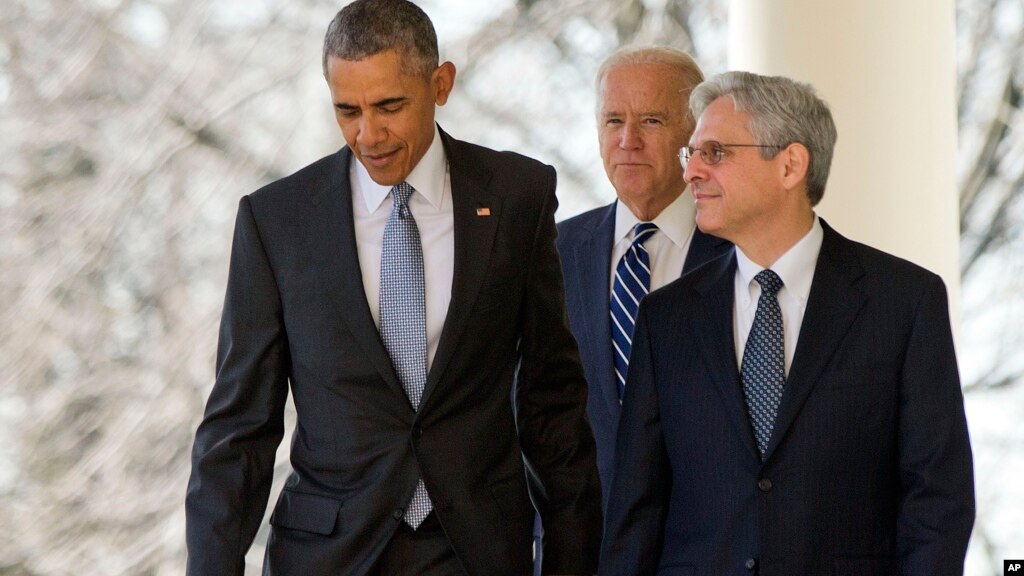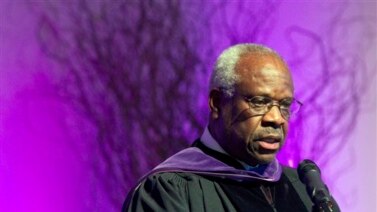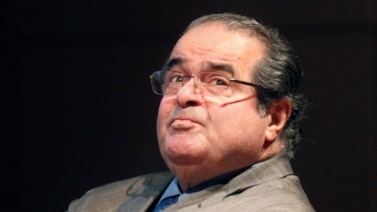
President Barack Obama has nominated Merrick Garland to the Supreme Court.
Garland, 63, is viewed as a moderate, based on his 19 years on the Washington, D.C. appeals court. He is now the court's chief judge. He won Senate confirmation in 1997 by a 76-23 vote. He had been nominated by former Democratic President Bill Clinton.
“This is the greatest honor of my life,” Garland said from the White House Rose Garden.
Garland worked for many years as a federal prosecutor. He led the team that prosecuted the Oklahoma City bombing, in which 168 were killed and more than 680 were injured. He also prosecuted American terrorist Theodore Kaczynski, known as the “Unabomber.”
“Judge Garland is a brilliant jurist whom I've admired ever since he was my constitutional law student,” said Laurence Tribe of Harvard University’s Law School. “His modesty, humility, and moderation make him a particularly suitable choice for these divided times.”

The other finalists were Sri Srinivasan, 47, an appellate court judge, who would have been the first Indian-American Supreme Court judge, and Paul Watford. Wadford is a California federal judge and would have been the Supreme Court's second African-American judge.
The Supreme Court has a vacancy because of the death last month of conservative Justice Antonin Scalia. Court decisions will be made by eight members until a ninth is confirmed.
The stakes could not be higher. The court is divided between conservative and liberal justices. The newly appointed justice could change the direction of the Supreme Court for years.
The White House said that Garland has had Republican support in the past, and should again.
But past support from Republicans might not matter now.
Senate Republican leaders say they will not consider any Obama nomination. They say they want the next president to choose the Supreme Court nominee. They hope voters in November will elect a Republican president, who would name a conservative to the court.
On Monday, the Republican National Committee (or RNC) announced it will start running TV advertisements to oppose any Obama nominee.
RNC Chairman Reince Priebus said Republicans plan to “make sure Democrats have to answer to the American people for why they don’t want voters to have a say in the process.”
Democrats say a president has a responsibility to fill a vacancy in America’s most important court. It does not matter, they say, whether the opening occurs in a president’s first year in office or his last.
The White House said Monday that its supporters would start a campaign to pressure the Senate to vote on the president’s nominee.
Obama told CNN he was choosing a “consensus candidate” to replace Scalia.
Democratic Senator Charles Schumer of New York said Senate Republicans would pay a political price if they do not consider the president’s nominee.
“To say that there will be no hearing, no vote, no consideration whatsoever even before a nominee is named to a vacancy, that is not doing your job; that is quitting before you start,” he said.
Some have called on Obama to name a woman to the Supreme Court. There are three women justices now on the High Court. Obama appointed two of them: Sonia Sotomayor and Elena Kagan.
Terry O’Neill, an attorney and president of the National Organization for Women, said the president should nominate a “well-qualified person” who is “dedicated to human and civil rights.”
A woman, she said, particularly an African-American woman, would bring more balance to the Supreme Court.
“Life experience matters,” O’Neill told VOA. “If you understand in your gut what it means to wake up afraid about a missed period, it clues you in to the extraordinary damage of Texas’ shutdown law for abortion providers.”
O’Neill was referring to a case just argued in the Supreme Court over a state abortion law in Texas. The law requires abortion facilities to meet tough new standards. Abortion providers say the standards are not needed and will shut down most health centers that perform abortions. Supporters say the new law protects the health of women.
The High Court is said to be divided 4-4 on how to rule on that case.
I'm Bruce Alpert.
Bruce Alpert reported on this story for VOA Learning English. Kathleen Struck was the editor.
We want to hear from you. Write to us in the Comments Section or share your views on our Facebook Page.
Words in This Story
notable – n. unusual and worth noticing
vacancy – n. an opening
consensus – n. a general agreement about something
whatsoever – adj. of any kind or amount at all
quit – v. to leave a job or to give up
momentous – adj. very important
checkered – adj. many problems of failures
period – n. referring to woman’s 'menstrual cycle
extraordinary – adj. very unusual


